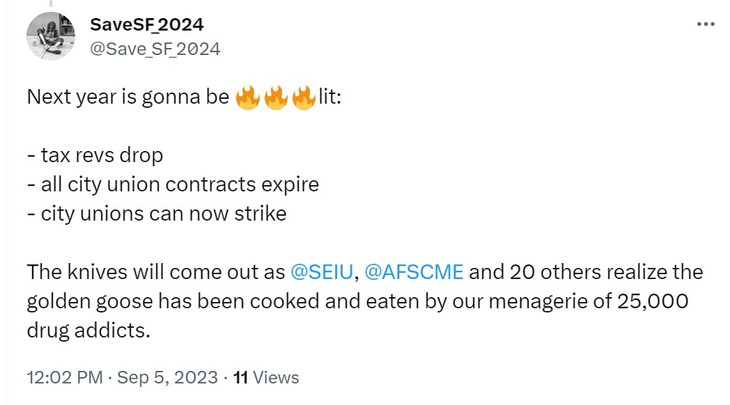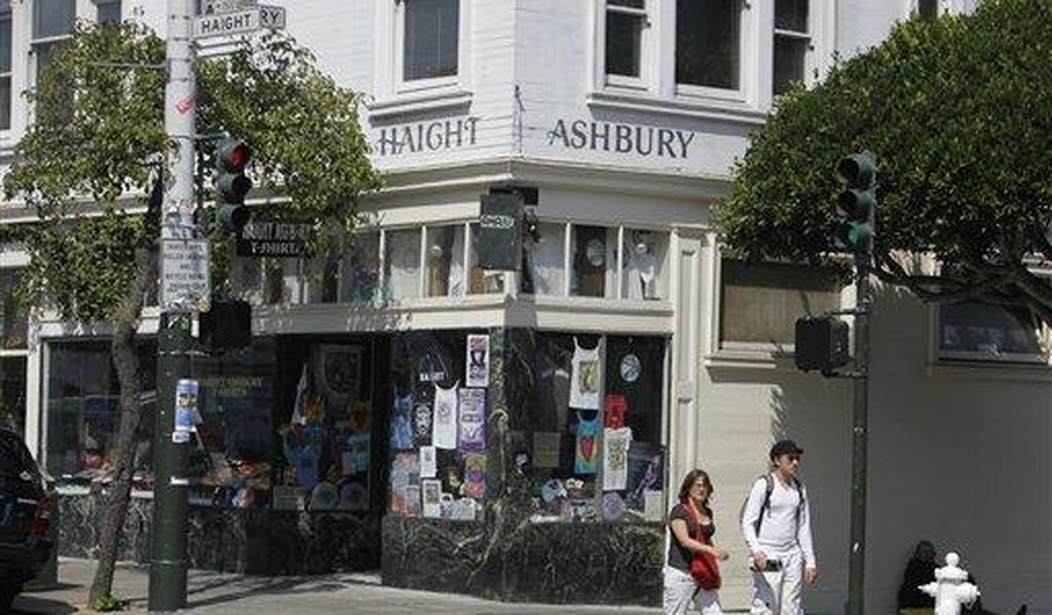And there was a collective gulp heard ’round City Hall.
I wouldn’t be surprised to find some of London Breed’s administrators forced into a life of crime to keep the street lights on…just kidding, just kidding. But “I don’t think we’ve reached the bottom yet” is all that encouraging, no?
Real estate transfer taxes have fallen off a cliff as fewer Downtown office buildings change hands. Some are selling at steep discounts. https://t.co/IHMMWZ4ETq
— The San Francisco Standard (@sfstandard) September 5, 2023
How bad was it? Well, now that they’ve toted everything up for last year, it’s looking grim.
The city’s transfer tax revenue—which is directly tied to the sale of buildings—has fallen off a cliff due to far fewer commercial properties trading hands. Home sales in San Francisco, which provide a smaller portion of transfer tax revenue, have also dropped from their 2021 peak.
In the last fiscal year, San Francisco pulled in $186 million in transfer tax revenue—the lowest number in more than a decade, according to Ted Egan, the city’s chief economist.
The city was already staring down a $720-744M budget shortfall in spending but they hadn’t counted on coming up almost $100M shy of their tax revenue estimate. That’ll put a wrinkle in your drawers.
There’s also another fiscal locomotive coming through the tunnel at them. A couple of weeks ago, I posted about how many building owners were petitioning for reductions in their appraised values, which translates into less taxes.
…Now building owners are finally asking, “Then why are we paying premium real estate taxes as if we were a bustling metropolis?”
For many of them, it also means a real estate tax refund for the difference. The city’s already expecting to pay out somewhere in the neighborhood of $167M over the next 2 years in refunds.
Then the reduced taxable income on those devalued properties is going to hit the city’s budget deficit even harder. Scratching and scraping along the bottom on top of the glacial pace of sales.
…Essentially, the lack of properties trading hands in the current market means few data points—“comps” in real estate terms—to help accurately price future deals. What deals are in the works are often coming in at prices lower than the city’s assessed value, which means a decline in incoming property tax revenue.
“We’re going to start to see these property sales having an effect on the market and perhaps accelerating the process of this sort of Downtown reset we’re all expecting,” Egan said. “I don’t think we’ve reached the bottom yet. I think when we reach the bottom is when things start moving at the bottom.”
Property taxes are the single largest source of revenue for San Francisco, earning more than $2 billion annually to pay for city services like street cleaning, public health programs and law enforcement.
The “bleeding revenue” trend is gruesome…
…By and large, though, the drop in values means lower revenue for the city. For 550 California, which is expected to sell for less than half of its 2005 price, the city stands to lose nearly $1.4 million in property tax revenue based on the current assessed value, according to Sanandaji’s analysis.
The North Park office complex in Jackson Square is also rumored to be testing the market at a two-thirds discount to the $245 million it was purchased for back in 2018. If the property changed hands at that price, the city would stand to lose $2.1 million in property tax revenue.
I DON’T THINK WE’VE REACHED THE BOTTOM YET

Being San Francisco, they’ve been trying since spring to get people interested in coming back downtown. But they been trying all sorts of “San Francisco” things – not anything that would improve the living conditions enough to make someone want to stay in the area permanently.
Shoot. They have enough trouble getting them to come for the special events they organize as it is. “YAY, look, a street fair” doesn’t really cut when it’s too dangerous walking the street to get to it, capiche?
Facing tax revenue shortfall, San Francisco struggles to make downtown vibrant
…A real estate report from CBRE shows San Francisco office vacancy rate rose to a record high of almost 30 percent this year due to remote work.
City leaders say fewer workers led to more business closures and lower tax revenues.
“It’s about bringing people back together and reminding people that San Francisco and our downtown is so much more than only our offices and our work,” said Kate Sofis, executive director of the Office of Economic & Workforce Development.
…Some neighbors say that, aside from policy changes, the city needs to invest in cleaner and safer streets. They say no one wants to walk through open drug markets to get to a street fair.
But that’s just how clueless the people who run San Francisco – and the activists who enable them – are.
San Francisco also has the highest corporate tax rate of any California city – that’s breathtaking, I’m sure. San Francisco residents were quick to pile on the penalties for success when everyone was living large, but now?
Lay-offs, the pandemic, work-from-home, begging people to return to the office, and an over 30% vacancy rate downtown, with more leaving all the time?
…In 2022, the five largest taxpayers accounted for $339 million in business taxes, or 24% of the total, according to the study by the Controller’s Office and Treasurer and Tax Collector. A decade earlier, the top five taxpayers accounted for only 7% or $30 million of all business taxes. The top 100 taxpayers accounted for 58% of all business taxes in 2022, compared to 34% in 2012.
A number of factors led to this trend: The largest companies, particularly in tech, grew at a faster rate than the rest of the economy over the past decade. And voters approved a slew of tax increases targeting the biggest companies.
…Before the pandemic, voters approved tax increases amid a booming economy that fueled a massive expansion of the city’s budget. Per capita tax revenue doubled between 2002 and 2022, from $3,003 per resident to $6,838, adjusted for inflation. The next fiscal year’s city budget is projected to be $14.6 billion, another record high, but the city now faces major deficits in the next few years.
San Francisco has long had the highest corporate taxes of any California city. The identities of the biggest taxpayers are confidential, but some of the city’s largest employers have recently cut jobs amid a wave of global corporate layoffs.
Bet they sure won’t discuss doing anything about that as much as they love mouthing “reform.”
The bottom is about to drop out from under them, population-wise and economically, but…Yay! A street fair!








Join the conversation as a VIP Member